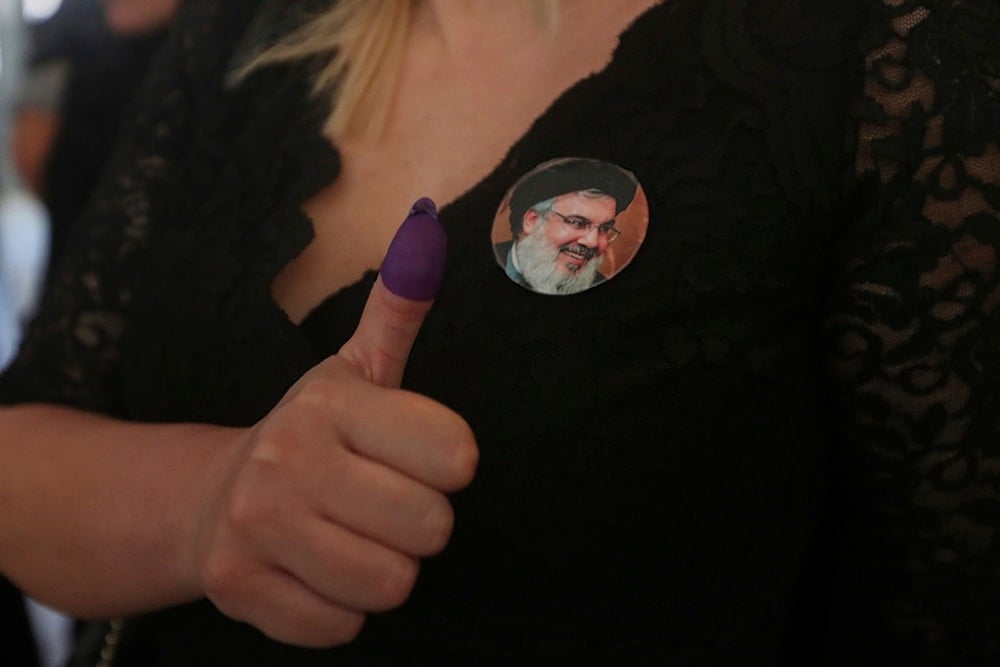Lebanon concludes municipal elections amid Israeli strikes on south
Lebanon wraps up its municipal elections despite ongoing Israeli strikes on southern villages, as the final turnout rates varied from 20% in Beirut to over 45% in Akkar.
-

A woman displaying a portrait of martyred Hezbollah leader Hassan Nasrallah, shows her ink-stained thumb after casting her vote at a polling station during municipal elections in the town of Nabatieh, south Lebanon, Saturday, May 24, 2025 (AP)
Lebanon's municipal and mayoral elections officially concluded on Saturday with the closing of polling stations in the southern governorates of Southern Lebanon and Nabatieh. This final round of voting came against the backdrop of continued Israeli bombardment targeting villages and towns in southern Lebanon, where many residents still turned out to cast their votes.
Despite the escalation in tensions, voter turnout remained steady across several southern districts. According to official figures, participation rates were as follows:
- Jezzine: 41.37%
- Sidon (Saida): 41%
- Nabatieh: 41.35%
- Tyre (Sour): 36%
- Hasbaya: 35.38%
- Marjayoun: 30.40%
- Bint Jbeil: 26.50%
Four-stage electoral process closes
Saturday marked the fourth and final stage of Lebanon’s staggered municipal election process. Previous rounds took place across different regions throughout the month of May:
- May 4 (Mount Lebanon): Voter turnout stood at 44.59%.
- May 11 (North Lebanon and Akkar): Turnout reached 34.41% in the North and 45.16% in Akkar.
- May 18 (Beirut, Bekaa, Baalbek-Hermel): Participation was 20% in Beirut, 44.90% in Baalbek-Hermel, and 42.84% in Bekaa.
This year’s municipal elections unfolded amid mounting security challenges and economic hardships, especially amid continuous Israeli bombardment of various areas across Lebanon.
Sheikh Qassem urges massive southern turnout in municipal elections
On Thursday, Hezbollah Secretary-General Sheikh Naim Qassem delivered a message to the people of southern Lebanon ahead of the final round of municipal and local elections, praising their decades-long resilience and sacrifices in the face of repeated Israeli aggression.
Framing the upcoming municipal elections as part of the resistance, Sheikh Qassem described them as "a challenge tied to the steadfastness of our position and our commitment to the land, to its reconstruction, to its people, its orchards, its homes, and the life it deserves."
He added that those aligned with the Israeli occupation were watching closely, "All those who bet on the Israeli aggression are awaiting the results."
Sheikh Qassem made clear that the Resistance views participation as a patriotic duty, not merely an electoral exercise. "We are not asking you to achieve victory in the elections; you are already victorious, God willing, through your unity, your support for Amal and Hezbollah, your backing of the Loyalty and Development lists, and your embrace of the resistance. You are the resistance," he said. "We call on you to intensify your presence and participation in the elections so that victory is thunderous."
'Israel' bombs Lebanon ahead of election
Israeli warplanes targeted Thursday evening the town of Deir Antar in southern Lebanon, Al Mayadeen’s correspondent reported.
Israeli aircraft struck the towns of Shamaa and Aitaroun, targeting prefabricated structures, according to our correspondent.
As part of its continued evening assault on southern Lebanon, Israeli warplanes launched an airstrike on Wadi Hassan.
Earlier, Lebanese state media said an Israeli air strike hit a building in Toul after the Israeli occupation military warned residents to evacuate the area.
The Israeli military claimed it had carried out several strikes targeting Hezbollah sites and killed one person.
Lebanon's official National News Agency (NNA) reported that the Israeli occupation military struck a building in Toul.
Less than an hour after bombing a residential area in the southern town of Toul, Israeli warplanes conducted two additional airstrikes, one targeting the area between the towns of Touline and al-Sawwaneh in the south, and the other hitting the outskirts of the town of Bouday in Lebanon’s Bekaa region.

 4 Min Read
4 Min Read










